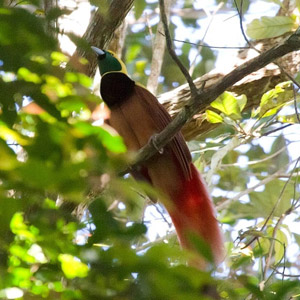Magazine | Analyses
Trois comportements nuptiaux de paradisiers (oiseaux de paradis)

Paradisier de Raggi (Paradisaea raggiana) mâle dans le parc national de Varirata.Photographie : Michel Ottaviani
Introduction
Les oiseaux de paradis font partie de la famille des Paradisaeidés et de l’ordre des Passeriformes. Ils sont distribués principalement en Nouvelle-Guinée et sur certaines îles proches, dans l’archipel des Moluques (Indonésie), et au nord et à l’est de l’Australie.
La famille comprend 43 espèces (un chiffre variable selon les sources), dont 38 sont présentes en Nouvelle-Guinée, et elle est divisée en une dizaine de genres : Paradisaea, Lophorina, Parotia, Cicinnurus, etc.
Cette famille est l’une des plus fascinantes du monde, et les mâles de plusieurs espèces sont connus pour leur spectaculaire plumage et leur parade nuptiale élaborée, combinant parfois poses, danses et chants. Et pourtant, les paradisiers sont apparentés aux Corvidés !
Après un article consacré à leur évolution, leur répartition, leur régime alimentaire, leur habitat, nous abordons ici leur comportement nuptial si complexe, en nous attarant sur les parades de trois espèces.
Abstract
The birds of paradise are members of the family Paradisaeidae which probably evolved on the island of New Guinea. The family is comprised of 43 species, 38 of which are found mainly or entirely on New Guinea. Two species are found only in the Moluccan Islands to the west of New Guinea, and four others are found mainly or entirely in northeastern Australia.
The members of this family are perhaps best known for the plumage of the males of most species, and their elaborate mating rituals. Some genus such as Paradisaea have a lek-type mating system, while others, such as Cicinnurus and Parotia, have highly ritualized mating dances. Males are polygamous in the sexually dimorphic species. Hybridization is frequent in these birds.
After an article presenting thie family, describing their evolution, feeding habits, distribution and habitat, we describe here their mating rituals, focusing on the courtship behaviour of three species: Superb Bird-of-Paradise Lophorina superba, Greater Birds of Paradise Paradisaea apoda apoda and Carola’s Parotia bird-of-paradise Parotia carolae.
Poursuivez la lecture de cet article, en vous abonnant dès maintenant !
Découvrez les Archives d’Ornithomedia.com
Pour seulement 10,00 €TTC/an (ou 6,00 € les 6 mois)
Profitez de plusieurs centaines d’articles en accès illimité et sans aucun engagement.
Compléments
À lire aussi sur Ornithomedia.com
- Les paradisiers, des oiseaux passionnants
- Voyage ornithologique en Nouvelle-Guinée du 3 au 23 décembre 2011
Ouvrages recommandés
- Birds of New Guinea de Bruce M. Beehler (Auteur), Dale A. Zimmerman (Auteur), Thane K. Pratt (Auteur)
- Papua New Guinea Birds de Roy D. MacKay et Margaret MacKay
- >Carte routière : Papua New Guinea (Carte) de Cartes ITM
- Lonely Planet Papua New Guinea & Solomon Islands de Regis St. Louis
Sources
- Science Encyclopedia Vol 1
- Beehler, Bruce M. A Naturalist in New Guinea. Austin, TX: University of Texas Press, 1991.
- Beehler, Bruce M., Thane K. Pratt, and Dale A. Zimmerman. Birds of New Guinea. Princeton, NJ: Princeton University Press, 1986.
- Frith, C.B., and B.M. Beehler. The Birds of Paradise: Paradisaeidae. Oxford University Press, 1998.
- Perrins, C.M., and A.L.A. Middleton, eds. The Encyclopedia of Birds. New York: Facts on File, 1985.
- Raven, Peter, R. F. Evert, and Susan Eichhorn. Biology of Plants. 6th ed. New York: Worth Publishers Inc., 1998.
- Michael Heads. Birds of paradise, biogeography and ecology in New Guinea: a review, Science Faculty, University of Goroka, Goroka, Papua New Guinea, Journal of Biogeography, Volume 28, Number 7, pp. 893-925(33), 2001
- E. Scholes. Investigating the evolution of the genus Parotia (aves: Paradisaeidae): Revealing the association between courtship display behaviour and bird of paradise biodiversity, with implications for conservation, Kentucky Natural History Museum, University of Kansas, and the Cornell University Museum of Vertebrates2000-2003 (http://apscience.org.au/projects/PBF_01_4/pbf_01_4.htm).
- Gary B. Nunn and Joel Cracraft Phylogenetic Relationships among the Major Lineages of the Birds-of-Paradise (Paradisaeidae) Using Mitochondrial DNA Gene Sequences, Department of Ornithology, American Museum of Natural History, Central Park West at 79th Street, New York, New York, 10024.
- Brian K. McNab. Food habits and the evolution of energetics in birds of paradise (Paradisaeidae), Department of Zoology, University of Florida. Journal of Comparative Physiology B: Biochemical, Systemic, and Environmental Physiology, 2005.
- Michael Heads, Birds of paradise (Paradisaeidae) and bowerbirds (Ptilonorhynchidae): regional levels of biodiversity and terrane tectonics in New Guinea, Science Faculty, University of Goroka, Papua New Guinea, Journal of Biogeography, 2006.
- Michael Heads. Birds of paradise, vicariance biogeography and terrane tectonics in New Guinea Journal of Biogeography 29 (2), 261-283, 2002.
- James J. Dinsmore; Courtship behaviour of the Greater Birds of Paradise Paradisaea apoda apoda), The Auk, vol. 87, 1986 – D.W. et C.B. Frith. Courtship Display and Mating of the Superb Birds of Paradise Lophorina superba, Emu 88, 183-188, 1987.
- Lokki, J., Jännes, H. & Nikander, P. J., 1992: Otavan lintutieto. -Kustannusosakeyhtiö Otava, Helsinki, Finland, 1992, pp. 1-440 Translated from: Perrins, C. M. (ed.), 1990: The Illustrated encyclopaedia of birds. Headline Book Publishing Plc., London, England, 1990
- Sibley, C. G. & Monroe, B. L., 1990: Distribution and taxonomy of birds of the world. -Yale University Press, New Haven & London, 1990. xxiv-1111.




Aucun commentaire sur ce sujet
Participer à la discussion !